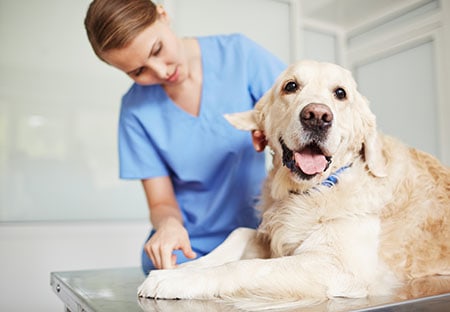
If you are going to sterilize your dog, here we will explain how to take care of her after surgery.
While castration is a safe surgery – it has been perfected to the point that nowadays it barely leaves a scar – and the animals recover easily, you will still need to make sure that everything goes smoothly after the operation.
First care after the sterilization procedure
Canine ovariohysteroctomy is performed under general anesthesia, through a small incision in the abdomen.
Generally it is not necessary for the animal to remain hospitalized for a long time after recovering from the effects of sedation, and it can in fact continue the recovery period at your home, following the instructions of the veterinarian.
- Don’t be alarmed if your dog moves awkwardly at first ; it’s about the effects of anesthesia.
- Avoid making efforts . Carry her home, if her weight allows it, otherwise enable a vehicle to move her.
- The space intended for its recovery must be comfortable, warm, and above all clean ; in this way there is no risk of the wound becoming infected.
- Your dog is very likely not to want to eat immediately, or even vomit. He will regain his appetite as soon as the effects of the anesthesia have worn off completely.
In any case, the ideal in these cases is that you eat little and lightly . The next morning you can resume your usual diet.
- Also do not be afraid if the animal does not defecate for two or three days, it is normal for this to happen following surgery.
- Remove the bandage from the wound at the time indicated by the doctor. This is generally done the day after the operation.
- Try to stop her from licking herself or scratching the suture. It could tear the stitches, open the wound, or cause an infection. You may need to have her wear an Elizabethan collar to prevent her tongue from reaching the area where the incision is located.
- Give her the antibiotics and painkillers your veterinarian has indicated . If you see that despite taking these, your pet continues to show signs of discomfort or pain, do not give him any other type of medicine: even less if it is for humans.
Don’t hesitate to consult your vet as often as necessary.
- If you have other pets in the house, check that they are not licking her wound or playing roughly with her either. Keep it separate or put on a clean cotton shirt to cover the incision.
- Make sure he gets enough rest in a quiet environment, so that he can recover from the stress of the situation he just experienced.
- It is important that during the first 24 hours after surgery, the animal does not remain alone but is under constant supervision.
How your dog’s recovery is progressing
Your pet’s rest should continue for several days . At least until the vet visits him again and decides whether or not to remove the stitches.
If you have had absorbable stitches applied, you will still need to take her to the doctor to make sure everything is fine.
Meanwhile:
- Check that he does not make sudden movements or intense exercises . He must not jump, run or climb stairs. Keep in mind that in addition to the external suture, there are also internal stitches.
- You can take her for short walks, but always paying close attention so that she does not make an effort and does not get agitated in the face of situations from the outside world.
- Unless directed by your vet, don’t disinfect his wound. Just look at it to make sure everything is okay.
If you experience any redness, swelling, bleeding or suppuration, take her to the vet immediately.
- In addition, if in the days following the surgery the animal continues to be dejected, refuses food and has a fever , take it urgently to a veterinarian.
Always keep in mind that while surgery may not be a pleasant time for your pet to go through, the benefits will be more than evident.
In addition to eliminating the inconveniences of unexpected litters , you are freeing her from problems with uterine infections, also decreasing the chances of developing breast cancer.
Remember that your dog will need approximately 10 days to fully recover from the operation and return to her normal life.
In the meantime, have a lot of patience and give him all the necessary attention so that everything runs smoothly . And love it as always.






